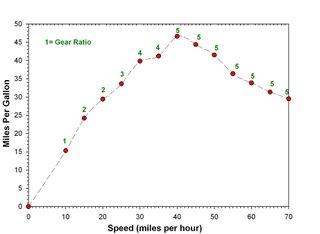Some fun; global and local optima
First: there is a debate going on about the minimum wage. Some wish to raise the federal minimum wage. The question, of course, is "does this do the poor workers any good?" The debate seems to be: "if you raise the minimum wage, the poorest of the workers will get more money, be better off, and have more to spend" vs. "raise the wage, and businesses won't be able to hire as many workers."
I don't have any economic credentials and therefore won't be talking about that issue specifically, though I do know from history that those old "company store" days didn't benefit anyone.
But what did strike me as odd is the following type of argument that I've heard (on a recent PBS Newshour program):
http://www.pbs.org/newshour/bb/business/jan-june06/minwage_06-21.html
My note: June O'Neill is an economics professor at Baruch College and served in the Office of Management and Budget in the mid 1990's.GWEN IFILL: June O'Neill, what about the argument that raising the minimum wage would basically be the tide that lifts all boats, that even though people aren't necessarily making $5.15 an hour now, they could be making more?
JUNE O'NEILL: Well, for one thing, the vast bulk of people are nowhere near the minimum wage. They're earning much more than the minimum wage, so I don't think that they could speak too well. They're not talking about themselves.
But if it's such a magic wand, why stop at $5.15? Why stop at $7.25? Why not say $15 an hour? And then, voila, everyone will be earning $15 an hour and we would do all kinds of good, because you know that employers are not going to employ people. There are other places that they can go.
Anyway, it is this argument that I want to pick up on. Suppose you wanted to optimize some economic measure for the lowest income people. Dr. O'Neill seems to be saying that if you think that a small raise in the minimum wage will benefit people, then it follows that a larger raise ought to benefit them more, and of course raising the minimum wage to an absurd level doesn't make sense. Therefore, raising it at all (or even having one at all) makes no sense.
But this argument simply doesn't make sense to me, and here is why: sometimes, an optimum can occur at a local optimum point. It depends on the model.
Bear with me while I give an example:
take, for instance, gasoline mileage. Everyone who has driven a car knows that you get fewer miles per gallon when driving 70 miles per hour than when you drive, say, 55 miles per hour. (of course, I am not talking about race cars). So, driving slower always means getting better mileage right? Well, wrong. What happens when, say, you do lots of driving, say at 20 miles per hour? You get bad gas mileage!
So you see, the best gas mileage comes at a certain speed. Here is a real life efficiency curve:
http://www.fsec.ucf.edu/pubs/energynotes/en-19.htm
 Click to see a larger version. So, if you are driving, say, at 35 miles per hour, you should speed up to get better gas mileage. If you are driving say, at 65 miles per hour, then you should slow down to get better gas mileage.
Click to see a larger version. So, if you are driving, say, at 35 miles per hour, you should speed up to get better gas mileage. If you are driving say, at 65 miles per hour, then you should slow down to get better gas mileage.The speed corresponding to the peak of the graph (about 45 miles per hour) is what is known as a local maximum; if you are at that speed and change speed in either direction, your gas mileage goes down. It is also a "global" maximum, in that this is the best speed to drive in terms of gas mileage.
The same thing could be true of the minimum wage; we could well be at a point where raising the minimum wage will help things, though if it is raised too much it might end up hurting the poorest workers.
But either way, what Dr. O'Neill said (the part in bold) is not necessarily a valid argument.
Now for some fun stuff:
Darksyde of the Daily Kos has a good science diary; he writes one every Friday.
Today's can be found here:
http://www.dailykos.com/storyonly/2006/6/23/74340/6263
Today he interviews cosmologist Sean Carroll.
Sean Carroll has a cool blog worth checking out: http://cosmicvariance.com/
Finally, reading a comment on another blog reminded me of the film 2001: A Space Odyssey. I have to admit that I never "got" some of the weirder stuff in that film. But there is a website that takes a credible stab at some of the symbolism and makes some sense to me:
http://www.kubrick2001.com/
Anyway, I found that a fun site to visit.


0 Comments:
Post a Comment
<< Home